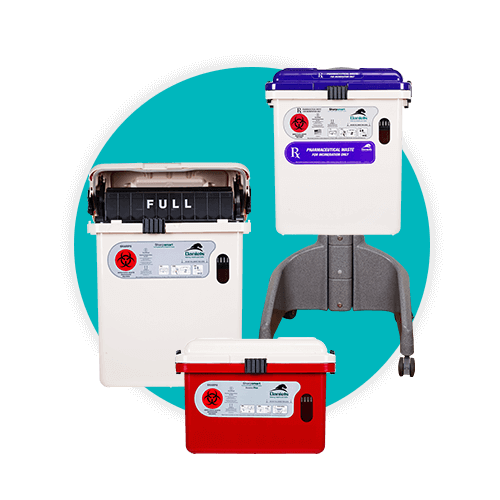Vermont Medical Waste Disposal Services
Daniels are the leading experts in compliance, clinical containment and environmentally responsible waste management services. Transparent pricing, customized scheduling, immediate cost reduction.
Infection minimizing innovation for the collection of Regulated Medical Waste
The Daniels Medismart is the first regulated medical waste system to truly modernize RMW waste management. Reducing time and labor, preventing infection transfer, eliminating multi-handling of waste, preventing sharps injuries, and dramatically improving waste segregation, the Medismart ushers in a new era of safe point-of-use and cost-effective medical waste disposal.
Across 6 countries, Daniels has become a brand name synonymous with healthcare innovation and service
In 39 years Daniels have become experts in delivering solutions for the niche requirements of healthcare. Today over 125,000 services are fulfilled annually across the United States by Daniels owned and operated fleet. From small practices to large medical facilities, our scalable business model ensures that every customer receives:
- Timely scheduled services with clear transparent communication
- Minimum disruption to patient care
- Safety and Security underpinning all biohazardous waste handling practices
- A positive and friendly customer experience
- Cost-effective customized solutions that guarantee efficiencies and maximize savings
Innovation in medical waste management is essential
Without innovation, we would still have the horse and cart. Quaint… but not safe or efficient! Much like cardboard boxes for medical waste…
Let us present a paradigm shift in the form of a question: would you place a cardboard box in your kitchen or living room to collect waste? You may be the exception, but 99% of people would say no, for the very same reasons it’s not acceptable in a hospital or clinical environment – leakage, contamination, handling risks, and for the simple reason of being “unsightly”. Daniels safety containers for medical waste, chemotherapy waste, pharmaceutical waste and medical sharps are designed with clinicians to ensure they capture the needs of healthcare environments. Let us introduce you to the future of medical waste management.
Sharpsmart. World Leading Sharps Safety Technology
Peer reviewed in four independent studies, clinically proven to reduce needlestick Injuries by up to 87%, and relied on by healthcare facilities around the world, the Sharpsmart system is driven by a single objective – To Save Lives. Designed with 13 safety features, manufactured with needle-impenetrable plastic, a gravity balanced safety tray for risk-free sharps disposal, and a built-in overfill protection mechanism, the Daniels Sharpsmart is the most advanced sharps container system in the world.
Greener Medical Waste Treatment
Daniels robotic washing technology achieves greater microbiological efficacy in container washing than any other system
Sharpsmart eliminates up to 99% reduction in the manufacture of containers. Significant reduction in Greenhouse Gas Emissions and landfill waste. Washing process recycles water to reduce ecological impact. Achieves high-level disinfection while avoiding the use of environmentally harmful chemicals.
Medismart, the future of medical waste management
Infection minimizing innovation for the collection of Regulated Medical Waste
The Daniels Medismart is the first regulated medical waste system to truly modernize RMW waste management. Reducing time and labor, preventing infection transfer, eliminating multi-handling of waste, preventing sharps injuries, and dramatically improving waste segregation, the Medismart ushers in a new era of safe point-of-use and cost-effective medical waste disposal.
How We Serve You
Across 6 countries, Daniels has become a brand name synonymous with healthcare innovation and service
In 39 years Daniels have become experts in delivering solutions for the niche requirements of healthcare. Today over 125,000 services are fulfilled annually across the United States by Daniels owned and operated fleet. From small practices to large medical facilities, our scalable business model ensures that every customer receives:
- Timely scheduled services with clear transparent communication
- Minimum disruption to patient care
- Safety and Security underpinning all biohazardous waste handling practices
- A positive and friendly customer experience
- Cost-effective customized solutions that guarantee efficiencies and maximize savings
Without innovation, we would still have the horse and cart. Quaint… but not safe or efficient! Much like cardboard boxes for medical waste…
Let us present a paradigm shift in the form of a question: would you place a cardboard box in your kitchen or living room to collect waste? You may be the exception, but 99% of people would say no, for the very same reasons it’s not acceptable in a hospital or clinical environment – leakage, contamination, handling risks, and for the simple reason of being “unsightly”. Daniels safety containers for medical waste, chemotherapy waste, pharmaceutical waste and medical sharps are designed with clinicians to ensure they capture the needs of healthcare environments. Let us introduce you to the future of medical waste management.
Peer reviewed in four independent studies, clinically proven to reduce needlestick Injuries by up to 87%, and relied on by healthcare facilities around the world, the Sharpsmart system is driven by a single objective – To Save Lives. Designed with 13 safety features, manufactured with needle-impenetrable plastic, a gravity balanced safety tray for risk-free sharps disposal, and a built-in overfill protection mechanism, the Daniels Sharpsmart is the most advanced sharps container system in the world.
Let's Talk!
Your time is valuable, and we don’t want to play hard to get. You can either phone us directly on the details listed on our contact page, or feel free to fill out this short form and one of our team members will get back to you as quickly as possible.

 on clinical, environmental and cost outcomes across all waste streams
on clinical, environmental and cost outcomes across all waste streams